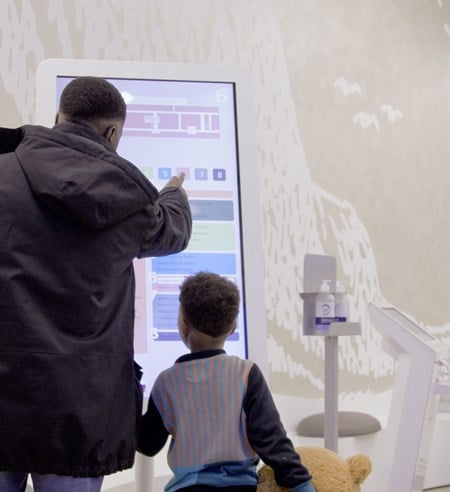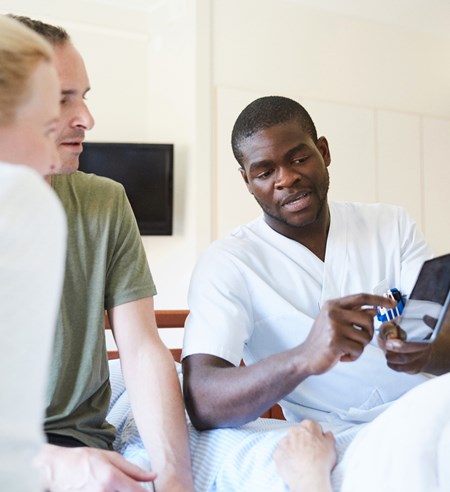Team manager, Product Owner
The challenge
Developing and producing a data-secure service package to support the quality of intensive care and anesthesia work in Finland, providing automatic, disease-specific data collection and thus streamlining data compilation and reporting. The service enables reliable data collection to the national quality register and improves the quality of care work nationally.
The solution
As a result of the benchmarking service, core data on the quality, severity, treatments as well as outcomes of diseases can be collected almost automatically from the information systems of the intensive care units. Finally, the data is stored in a national quality database. A key factor in producing good quality data is data validation. The service provides reliable information on the quality of care, points out areas of improvement, and simplifies the overall reporting of care work.
About the customer
The quality monitoring and benchmarking service of the Finnish adult intensive care units have been developed for the Finnish Intensive Care Consortium, hospital districts, and Finnish Institute for Health and Welfare (THL). All Finnish hospital districts and all intensive care units are included in the collaboration, apart from a few specialized intensive care units. Individual intensive care units from Switzerland and Estonia have also joined the collaboration.
Automated and secure
Supports the success of care work and enables lighter data collection. The adaptive system can be applied to benchmarking and data collection for a wide range of medical fields.

High-level customer service
Smooth communication and cooperative development work with a specialized team. During the Reporting Meeting, the community shares learnings and success cases. This ensures nationwide high-level care.
Evidence-based quality care
Provides comparable, advanced information on the results, effectiveness, and resources of care and collaboration. The information is used to develop care work and its quality nationally.
High-quality intensive care is built in collaboration
Due to the Finnish Intensive Care Consortium, consisting of the intensive care benchmarking service provided to the Finnish university and central hospitals, reliable information on the successes and results of intensive care can be accessed nationally. Long-term cooperation, swift communication, and open dialogue have established a solid foundation for high-quality intensive care.
The implementation of intensive care and the documentation of the results of treatments have played a key role in establishing the benchmarking service. Since 1994, the data from the benchmarking service has been utilized in the development of intensive care and anesthesia treatment throughout Finland. "The key results from intensive care are documented in a unified system. A significant part of the data collection is automated, which frees up time for daily care work", says Matti Reinikainen, Professor of Anaesthesiology and Intensive Care at the University of Eastern Finland.
As a result of the quality register and benchmarking, it has become possible to collect statistics on the number of treated patients, the severity of the illnesses, and the type of intensive care that has been required. This way the service produces comparable, advanced information on the results, effectiveness, and resources of the care and the collaboration.
“The level of healthcare is good everywhere in Finland. This is important to understand. This is also a result of consistent quality in the education of nurses and doctors. The healthcare professionals in Finland are very qualified”, says Stepani Bendel, Chairman of the Finnish Intensive Care Consortium and Chief Physician of the Kuopio University Hospital of the Intensive Care Department.
The Reporting Meeting - discussion and learning. Watch the video!
The customer case continues below this video.

The most important benefit is that the service can be integrated into our existing information systems. There is no need to enter all the data manually, as we have an automatic data entry that works well.
Stepani Bendel
Chairman of the Intensive Care Consortium, Chief Physician of the Kuopio University Intensive Care Department
The national overview of intensive care is coordinated from Eastern Finland
During the corona epidemic, the national coordination of intensive care has been handled in Eastern Finland, Kuopio. The responsibility of the coordinating hospital has been to ensure the smooth flow of patient transfers together with the sending and receiving unit. “Our unit has directed the efforts to create a clear overview of the state of intensive care departments in different parts of Finland. Additionally, we have been in charge of some patient transfers from one intensive care unit to another”, Professor Matti Reinikainen describes.
Long-term cooperation and trust have played a significant role in enabling successful reporting. With the help of the quality register, it has been possible to assess long-term information on which areas of Finland the intensive care patients are typically located. “While we have been able to link the information to the data in the quality register, it has enabled us to address the additional measures required by the corona pandemic, " says Chief Medical Officer Stepani Bendel.
The cooperation has not only enabled homogeneous care, but also high quality of care, regardless of where in Finland you fall ill.
Matti Reinikainen
Professor of Anaesthesiology and Intensive Care, University of Eastern Finland
The Reporting Meeting enables joint development through collaboration
To further support and improve Tietoevry's benchmarking service and quality development activities, the annual Reporting Meeting have been established to allow the opportunity for open discussion and mutual learning. During the Reporting Meeting, participants present the results from different intensive care units to one another, share learnings and facilitate comparisons between different units.
"The analytical discussion during the Reporting Meeting is very valuable. As part of the Reporting Meeting the annual results discussions and the developed networks of responsible doctors also promote the implementation of research projects", says Professor Matti Reinikainen.
“We have found that these comparisons help improve the healthcare outcomes among all participating units. Communication is effortless and in case of an urgent matter, you know who to contact right away. We would not be able to share learnings with other intensive care units in this way without the Reporting Meeting”, says Chief Physician Stepani Bendel.
Intensive care units from Switzerland and Estonia have also joined the national Intensive Care Consortium. As a future vision, Reinikainen suggests that benchmarking data could also be shared on an international level. “There would be a strong interest between the Nordic countries and the Netherlands in a commonly shared quality register. This would allow the comparison of treatment outcomes across borders. It would enable scientific research and the development of treatments in an entirely new way”, Professor Matti Reinikainen adds.
Over the years, the benchmarking service has developed into a smooth, well-functioning system and collaboration.
Matti Reinikainen
Professor of Anaesthesiology and Intensive Care, University of Eastern Finland





